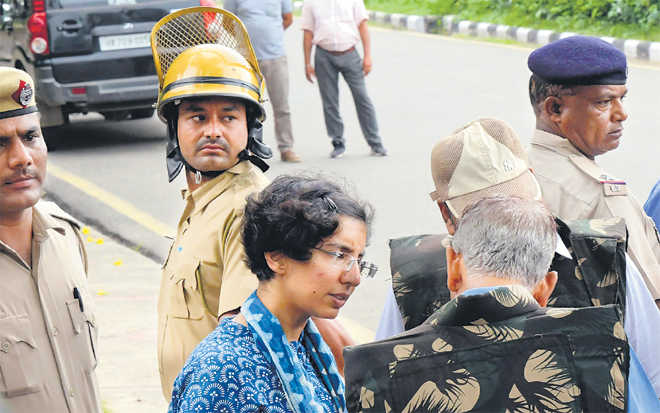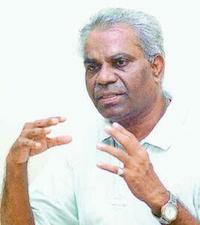

“Before doing so she did not call up the CM, not even the Chief Secretary or Home Secretary. Because there was no need since DM is the final authority. But this very DM had earlier allowed such massive and unruly crowd to assemble inside this small, satellite town of Chandigarh, despite prohibitory orders being in place! This is a clear case of governance failure and the state abdicating its primary role — that of maintaining law and order by taking preventive action”, says the author.
L’affaire Panchkula threw up a strange phenomenon, rather an apparition as to the maintenance of law and order, the primary responsibility of any civilized state. The District Magistrate and the police, representing the state, allowed the unruly crowd to assemble in large numbers. The Punjab and Haryana High Court directed how this crowd was to be controlled and it was the Army that controlled it. A complete role reversal of governance and government!
Everyone is pouncing on the Haryana Chief Minister. Naturally so, because this is the third time in three years that Khattar has proved his inefficiency. The Rampal incident in November 2014, which left six dead, was the beginning. The breakdown of the official machinery during the Jat agitation in February 2016 was the second. Now, it is the dera havoc in Panchkula and other places in the state that left many dead and bleeding.
But why is the CM being targeted when the statute is clear on who is responsible for maintaining law and order? Section 144 (1), CrPC, is meant to prevent unruly crowd to gather and indulge in arson and vandalism, and gives power to the DM, or other executive magistrates to issue such direction to ‘prevent obstruction, annoyance or injury to any person lawfully employed, or danger to human life, health or safety, or a disturbance of the public tranquility, or a riot, of an affray’.
Rule 1.15 of Punjab Police Rule, 1934 (adopted by Haryana) is more specific: ‘The DM is the head of the criminal administration of the district, and the police force is the instrument provided by government to enable him to enforce his authority and fulfil his responsibility for the maintenance of law and order. The police force in a district is, therefore, placed by law under the general control and direction of the DM who is responsible that it carries out its duties in such a manner that effective protection is afforded to the public against lawlessness and disorder.’ Therefore, it is the legally mandated duty of the DM called DC to take decisions and direct all steps to maintain law and order. The police is bound to obey all such directions.
When a situation becomes serious, as happened during the Jat agitation and now in Panchkula, Section 130 CrPC kicks in. This legal clause states that decision to requisition ‘armed forces’ to disperse ‘violent assembly of people’, which cannot otherwise be dispersed by the police or other forces available, should be taken by the DM. He/she ‘may require any officer in command of any group of persons belonging to the armed forces to disperse the assembly with the help of the armed forces under his command, and to arrest and confine such persons forming part of it….’ Law also says that ‘every such officer of the armed forces shall obey such requisition in such manner as he thinks fit, but in so doing he shall use as little force and do as little injury to person and property, as may be consistent with dispersing the assembly and arresting and detaining such persons’.
Law and the standard operating procedure are clear. The DM is the competent authority to direct the police and when the situation gets out of civilian control, to requisition the Army by a written order from the Magistrate on duty. The Army is then entirely in control with the officer-in-command in charge. Only that the Army is expected to bring the situation under control quickly and hand it back to the civil authorities and exit the scene.
The DC Panchkula, Gauri Parasher Joshi, performed her role rather belatedly and yet she saved the situation by pressing the Army into action when violence and arson reigned supreme. After being outnumbered by thousands of dera followers, the police fled the spot, leaving the young officer to almost fend for herself. Left alone with a single PSO, she decided to hand over the situation to the Army, which helped avoid further deterioration of the situation.
Before doing so she did not call up the CM, not even the Chief Secretary or Home Secretary. Because there was no need since DM is the final authority. But this very DM had earlier allowed such massive and unruly crowd to assemble inside this small, satellite town of Chandigarh, despite prohibitory orders being in place! This is a clear case of governance failure and the state abdicating its primary role — that of maintaining law and order by taking preventive action.
Fortuitously, the high court took over this role at the nick of time and shot-off a catena of orders: ‘All parties and every section of society should maintain peace and harmony; in case anybody indulges in any kind of violence, arson, loot, etc., he or they should be dealt with firmly by use of force, if necessary; the police force and paramilitary forces would have free-hand to deal with the situation wherever and whenever required against any individual or any section of society or organization; in case of need, the Army shall be deployed and made operational….’
All these are legally mandated duties of administrative and police officers who belong to the elite services of IAS and IPS, covenanted and protected by constitutional safeguards. Why then have they surrendered to politicians who have come to power at the mercy of rapists, murderers and money-launderers? So much so, the court had to issue such specific directions: ‘In case any politician or anybody else including ministers interferes in the enforcement of law, FIR be registered against him/them… No politician, leader, social worker, spiritual leader, religious leader or any such organization shall make any provocative speech or statement, which may have the tendency to affect public order.’
This raises a critical question — has the state lost it relevance, or rather has it withered away? Withering away of the state is a concept of Marxism, coined by Friedrich Engels, and referring to the idea that, with realization of the ideals of socialism, the social institution of a state will eventually become obsolete and disappear, as society will be able to govern itself without the state and its coercive enforcement of the law.
India shifted from equitable socialism to crony capitalism long ago. Under this, state is pandering to cheats, crooks and charlatans who either have big money or control vote-banks. Because ‘god-men’ command both, they are the object of adoration by small men who run the Indian state. As the adage goes ‘when small men cast long shadows, it means that the sun is about to set’. No wonder then that the state is fast withering away!
(The author is a former Haryana Cadre IAS officer)





Be the first to comment